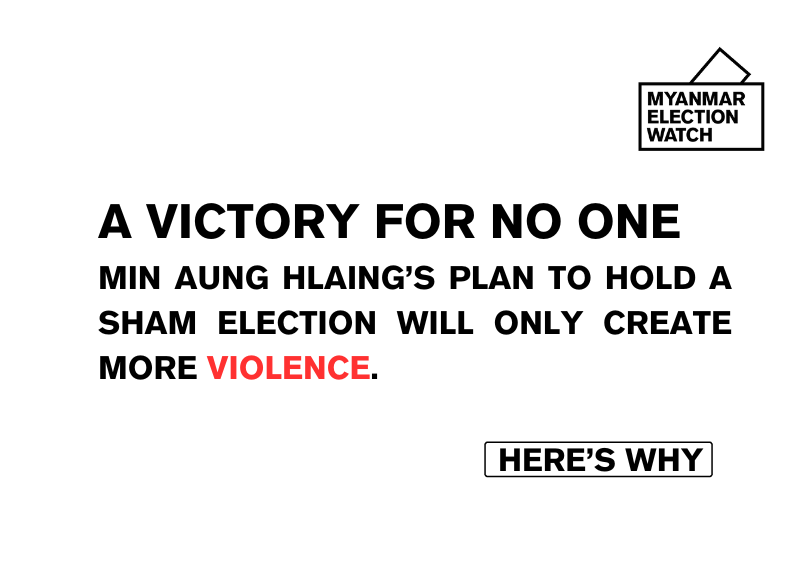On 15 June 2024, coup leader Min Aung Hlaing claimed that an election would be held in 2025. Speaking to civil servants and others in Meiktila, he labelled this future election a “victory for all the people.”

The announcement is not new. The junta reasserts periodically its promise of a future election. Sometimes it is apparently to be held across the country simultaneously, as if there is no conflict ravaging Myanmar. At other times, it is declared to be only for areas under military control.
The vague promise of a future election is the only plan the junta has. It is also the excuse for its census, an exercise in exclusion that would likely see many of those the military deems unsuitable wiped from the electoral rolls.
But the census and the vague promise lean upon a false claim, that any sort of election held under current circumstances would constitute a victory. Quite the opposite – an election and the preparations for one would constitute a grave threat to what remains of Myanmar, and would likely exacerbate conflict across the country.
Min Aung Hlaing is not actually running Myanmar, whatever his claims. The SAC lacks effective control over large parts of the country’s landmass and its population. Even in those areas where the military can claim overlordship by force of arms, it does not enjoy more than scraps of popular consent. In law, these are continuous tests, and by any such test, the junta is failing.
Failing and also flailing. This announcement of an election belongs in the same desperate space as conscription and the junta’s vain efforts to stave off economic chaos.
And, like conscription, any effort to impose an election upon a reluctant population will create more violence. It will expose election officials to great risk of harm – these are local administrators and teachers who often have little choice but to enforce rules they do not support. It will encourage and harden divisions between the ethnic parties that do not participate and some smaller pro-junta entities that might see an opportunity.
A parliament that emerges from such an election will be genuinely in-credible. It will not be believed by the people.
It was the Chinese Deputy Permanent Representative who said at the United Nations Security Council on 4 April that:
Be it a democratic transition or national reconciliation, it is up to all Myanmar parties… to take action in the best interests of the country and its people.
ASEAN and the international community must not give credibility to Min Aung Hlaing’s sham election.
The census alone constitutes a further risk of harm, and will exacerbate conflict.
The United Nations is unable to support the census plan. The junta alleged in December that its Minister for Population had met with the UNFPA representative Ramanathan Balakrishnan to discuss delivering a census. In fact, no such agreement exists - UNFPA have made that clear.
If the census is too risky, then an election would only lead to further widespread violence. It is not a path to reconciliation. An election would be a victory for no one.
